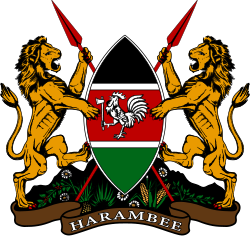 |
|---|
General elections were held in Kenya between 25 September and 2 October 1956, [1] with additional elections in March 1957 for eight African constituencies, the first in which Africans could be elected. [2] The elections in 1956 were open to Europeans, Indians and Arabs. [3] In the European constituencies the results saw eight Independent Group members and six independents (all from the United Country Party) elected. [4]
Contents
- Results
- European constituencies
- Indian constituencies
- Arab constituency
- African constituencies
- References
For the elections for the African constituencies in 1957 there were 37 candidates, whilst voter turnout was 78.5%. [5]